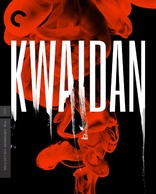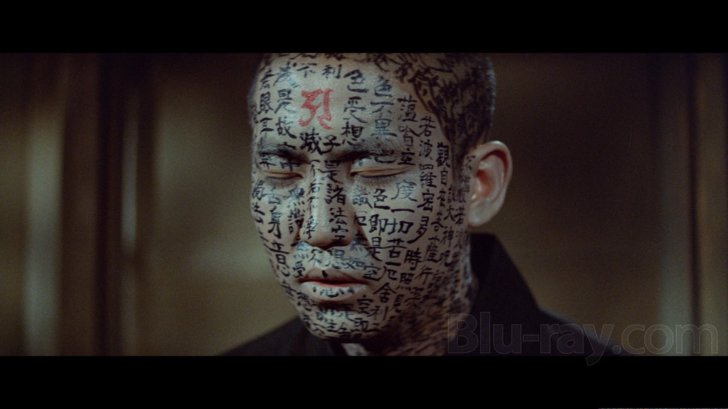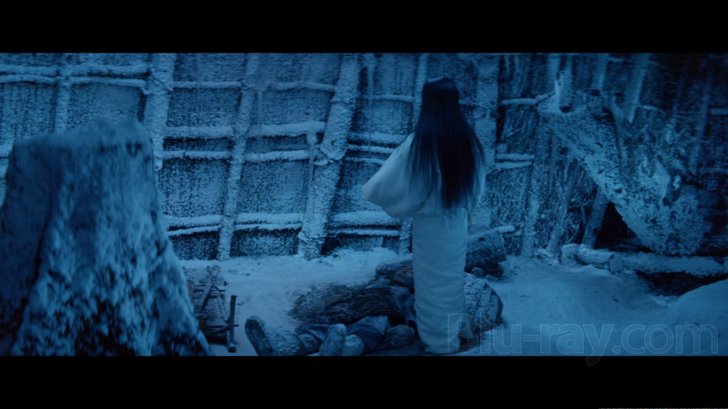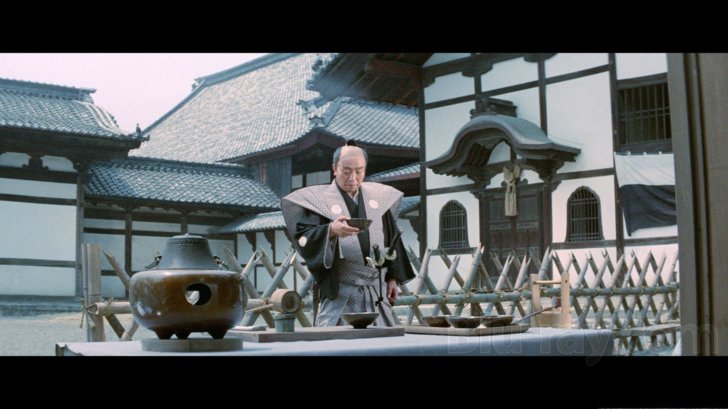Kwaidan Blu-ray Movie
HomeKwaidan Blu-ray Movie 
怪談 / KaidanCriterion | 1965 | 183 min | Not rated | Oct 20, 2015

Movie rating
8.1 | / 10 |
Blu-ray rating
| Users | 0.0 | |
| Reviewer | 4.5 | |
| Overall | 4.5 |
Overview
Kwaidan (1965)
Taking its title from an archaic Japanese word meaning "ghost story," this anthology adapts four folk tales. A penniless samurai marries for money with tragic results. A man stranded in a blizzard is saved by Yuki the Snow Maiden, but his rescue comes at a cost. Blind musician Hoichi is forced to perform for an audience of ghosts. An author relates the story of a samurai who sees another warrior's reflection in his teacup.
Starring: Tatsuya Nakadai, Takashi Shimura, Michiyo Aratama, Rentarô Mikuni, Kenjirô IshiyamaDirector: Masaki Kobayashi
| Foreign | 100% |
| Drama | 61% |
| Horror | 17% |
| Fantasy | Insignificant |
Specifications
Video
Video codec: MPEG-4 AVC
Video resolution: 1080p
Aspect ratio: 2.40:1
Original aspect ratio: 2.35:1
Audio
Japanese: LPCM Mono (48kHz, 24-bit)
Subtitles
English
Discs
50GB Blu-ray Disc
Single disc (1 BD)
Playback
Region A (locked)
Review
Rating summary
| Movie | 4.5 | |
| Video | 4.5 | |
| Audio | 4.5 | |
| Extras | 4.5 | |
| Overall | 4.5 |
Kwaidan Blu-ray Movie Review
Reviewed by Dr. Svet Atanasov November 5, 2015Winner of the Jury Special Prize at the Cannes Film Festival, Masaki Kobayashi's "Kwaidan" (1964) arrives on Blu-ray courtesy of Criterion. The supplemental features on the disc include original trailers for the film; filmed archival conversation between archival conversation between the Japanese director and Masahiro Shinoda; new video interview with assistant director Kyoshi Ogasawara; new interview with scholar Christopher Benfey; and new audio commentary with film scholar Stephen Prince. The release also arrives with an illustrated leaflet featuring Geoffrey O'Brien's essay "No Way Out". In Japanese, with optional English subtitles for the main feature. Region-A "locked".

Hoichi, the blind biwa player
All of the films Masaki Kobayashi directed prior to Kwaidan are firmly grounded in reality. Some are set in the years immediately after the end of WWII and focus on Japan’s struggle to rebuild itself. Some are period pieces that question and condemn traditional values and beliefs as well as the past social orders they defined. The majority of these films are dark and uncompromising, oozing angst and seeking to engage the mind and provoke reactions. (Kobayashi was an outspoken pacifist whose dissatisfaction with the socio-political status quo in Japan after the war is felt throughout his entire body of work).
Kwaidan is an odd entry in Kobayashi’s filmography. It is based on four stories from a novel by Lafcadio Hearn, each of which is set in a very unusual place. The best way to describe it is to say that it is the flip side of conventional reality. It is sort of a surreal place where ghosts coexist with ordinary people and time routinely slows down. This is the natural order of things there.
In each story, however, the order is disturbed. When this happens, the ghosts become angry and attempt to restore balance according to their liking. It isn’t pretty, but in a way they seem much more human as their actions and emotions are typically the logical ones. If there is a pure horror element in the film it is precisely this unusual switch, as it suggests that people are in fact weak and deeply flawed creatures that can easily slip and fall into the abyss of madness.
Though it could have been quite easy to do, the conflicts in the four stories are not used to produce any specific observations about Japan’s past leaders and their legacy. This is arguably the key reason why the film’s allure has not faded. It forces one to think about right and wrong, the logical and the illogical, but without ever crossing into conventional reality. The film looks and feels like a very long dream with memorable and through-provoking moments for everyone -- regardless of their age, political orientation, cultural background, and, most importantly, expectations.
There are very few other Japanese films in which music and sound effects are as crucial for the desired atmosphere as they are in Kwaidan. The great composer Tôru Takemitsu used traditional Japanese instruments and unique devices to produce a very distinctive modern soundtrack whose key themes remind of John Cage’s experimental work. Takemitsu also carefully managed silence and the sound effects to adjust the tone and rhythm of the film. (In most films this is done during the editing process, but in Kwaidan the shifts are actually introduced via the complex sound design).
Kwaidan was Kobayashi’s first color film. It was shot almost entirely on indoor sets, which is why select sequences look as if they were extracted from an elaborate theater play.
Kobayashi always considered the 183-minute version of Kwaidan to be its definitive version, but for years distributors around the world screened the shorter 161-minute version of the film. Kobayashi was forced to cut the film when he submitted it for consideration at the Cannes Film Festival in 1965.
This release of Kwaidan features a new restoration and reconstruction of the 183-version of the film with the original four stories: “The Black Hair”, “The Woman of the Snow”, “Hoichi the Earless”, and “In a Cup of Tea”. When the film was initially cut for the Cannes screening, the entire second story, “The Woman of the Snow”, was removed.
Kwaidan Blu-ray Movie, Video Quality 

Presented in an aspect ratio of 2.40:1, encoded with MPEG-4 AVC and granted a 1080p transfer, Masaki Kobayashi's Kwaidan arrives on Blu-ray courtesy of Criterion.
The following text appears inside the leaflet provided with this Blu-ray release:
"This new digital transfer of the original full-length version of the film was created in 2K resolution on a Scanity film scanner from the original 35mm camera negative and a 35mm interpositive. Thousands of instances of dirt, debris, scratches, splices, and warps were manually removed using MTI's DRS, while Digital Vision's Phoenix was used for small dirt, grain, noise management, jitter, and flicker. The complete monaural soundtrack for this 183-minute version was assembled from a variety of archival sources by Toho Co., Ltd., and remastered at 24-bit. Further restoration was done by the Criterion Collection using Pro Tools HD and iZotope RX 4.
Transfer supervisor and colorist: Lee Kline/Criterion, New York.
Scanning facility: Imagica Tokyo."
The film looks fresh and healthy. It is easy to see that careful cleanup has been performed because even tricky marks and scratches that are clearly inherited from the aged negative have been minimized as best as possible (see screencapture #12). Occasionally clarity and depth fluctuate, but these fluctuations are part of the original cinematography. The most obvious examples appear during the most atmospheric sequences where different lighting effects are used. Colors are stable and healthy, but in a few segments saturation probably could be slightly better. There are no traces of problematic degraining corrections. Grain is present throughout the entire film and well resolved. Also, there are no are traces of compromising sharpening adjustments. Unsurprisingly, the film has a wonderful, very fresh organic appearance. Finally, excellent stabilization improvements have been made. All in all, this is a very good technical presentation of the original longer version of Kwaidan that is guaranteed to please its fans. (Note: This is a Region-A "locked" Blu-ray release. Therefore, you must have a native Region-A or Region-Free player in order to access its content).
Kwaidan Blu-ray Movie, Audio Quality 

There is only one standard audio track on this release: Japanese LPCM 1.0. Optional English subtitles are provided for the main feature.
There are plenty of excellent and quite unusual sound effects in the film that greatly enhance its atmosphere. Fortunately, the very good lossless track makes it exceptionally easy to appreciate the film's complex sound design. At times even something as simple as the blowing wind can be immediately felt. The exotic music also greatly benefits from the lossless treatment (listen to the biwa solos, the bells, etc). The dialog is stable, clean, and always easy to follow. There are no pops, distracting background hiss, audio dropouts, or digital distortions.
Kwaidan Blu-ray Movie, Special Features and Extras 

- Commentary - in this brand new audio commentary, film scholar Stephen Prince, author of The Warrior's Camera, discusses Masaki Kobayashi's political orientation and body of work, Kwaidan and how it differs from the rest of the director's films, the importance of Tôru Takemitsu's minimalistic soundtrack as well John Cage's influence on his work, the unique sets/lighting and use of color, the film's financing, some of the key differences between the shorter and longer versions of the film, etc. The commentary was recorded exclusively for Criterion in 2015.
- Masaki Kobayashi - presented here is an archival conversation between director Masaki Kobayashi and filmmaker Masahiro Shinoda, which was shot in 1993 for the Director's Guild of Japan. The bulk of the comments address the funding and rather difficult production history of Kwaidan, the film's reception in Japan and Europe, the structure of its narrative, some specific stylistic choices that were made during the production process, and select themes from the four stories. In Japanese, with optional English subtitles. (16 min, 1080i).
- Kioshi Ogasawara - in this brand new video interview, Kyoshi Ogasawara, assistant director on Kwaidan, recalls how he became involved with the project, and discusses Yôko Mizuki's script and the important themes in the four stories from Lafcadio Hearn's novel, the tonalities and color schemes seen in the film, Masaki Kobayashi's working methods and his professional relationship with Tôru Takemitsu, the unusual balance between silence and sound in the soundtrack he created for the film, etc. Kioshi Ogasawara also explains why Masaki Kobayashi always considered the 183-minute version of Kwaidan to be its definitive version and how it was miraculously saved and restored after the director passed away. (For a number of reasons, the film had to be cut when it was submitted for consideration at the Cannes Film Festival. However, later on the shorter 161-minute version became the only version that was also distributed in various international markets). The interview was conducted exclusively for Criterion in 2015. In Japanese, with optional English subtitles. (22 mini, 1080p).
- Lafcadio Hearn - in this new featurette, English literature scholar Christopher Benfey, editor of Lafcadio Hearn: American Writings, discusses Lafcadio Hearn's life (and specifically his time in New Orleans and Japan), his writings, and Kwaidan: Stories and Studies of Strange Things and some of the key themes in it. The featurette was produced exclusively for Criterion in 2015. In English, not subtitled. (18 min, 1080p).
- Lafcadio Hearn - three original trailers for Kwaidan.
1. Black-and-White Trailer. In Japanese, with optional English subtitles. (2 min, 1080p).
2. Color Trailer 1. In Japanese, with optional English subtitles. (2 min, 1080p).
3. Color Trailer 2. In Japanese, with optional English subtitles. (4 min, 1080p).
- Leaflet - an illustrated leaflet featuring Geoffrey O'Brien's essay "No Way Out". (The author is editor in chief of the Library of America. His books include The Phantom Empire, Sonata for Jukebox, The Fall of the House of Walworth, and Stolen Glimpses, Captive Shadows: Writing on Film, 2002-2012).
Kwaidan Blu-ray Movie, Overall Score and Recommendation 

It is extremely difficult to profile Masaki Kobayashi's Kwaidan. It looks like a period surrealist films, but it feels strikingly modern. This release of Kwaidan features a new restoration of the longer version of the film with the original four ghost stories. It is very beautiful. The release also has a great selection of supplemental features. I particularly enjoyed the very informative new audio commentary by Stephen Prince. VERY HIGHLY RECOMMENDED.
Similar titles
Similar titles you might also like

Onibaba
鬼婆
1964

Kuroneko
藪の中の黒猫 / Yabu no naka no kuroneko
1968

Dreams 4K
夢 / Yume / Akira Kurosawa's Dreams
1990

Harakiri
切腹 / Seppuku
1962

The Phantom Carriage
Körkarlen
1921

Faust
Faust - Eine deutsche Volkssage
1926

Cronos
1993

The Magician
Ansiktet
1958

A Girl Walks Home Alone at Night
دختری در شب تنها به خانه میرود / Dokhtari dar šab tanhâ be xâne miravad
2014

Sansho the Bailiff
山椒大夫 / Sanshô dayû
1954

House
ハウス / Hausu
1977

The Life of Oharu
西鶴一代女 / Saikaku ichidai onna
1952

Les Enfants Terribles
1950

Throne of Blood
蜘蛛巣城 / Kumonosu-jô
1957

Leptirica
Лептирица | The She-Butterfly | Limited Edition
1973

The Mimic
장산범 / Jang-san-beom
2017

La Notte
1961

Tokyo Story
東京物語
1953

Belladonna of Sadness 4K
1973

The Lure
Córki dancingu
2015